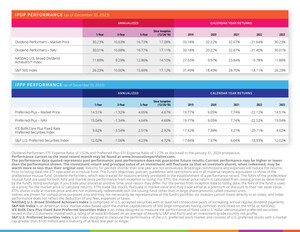Topic: Is Fear Costing Your Clients Millions? (Your Fear, Not Their Fear)
INDIANAPOLIS, Jan. 17, 2024 /PRNewswire/ -- Innovative Portfolios CIO Dave Gilreath, CFP® challenged members of the Financial Planning Association (FPA) of Greater Indiana during their November meeting about whether Advisors' fear of volatility might be negatively impacting their clients' investing outcomes.
With his question, "Is Fear Costing Your Clients Millions? (Your fear, not their fear)," Gilreath compared data about the top five fears of investors1 versus the fears experienced by Investment Advisors.2 While volatility's impact on their client portfolios was the #1 concern for Advisors, nearly 4 in ten (39%) investors indicated that volatility has been so high that they typically don't worry about it anymore, ranking it 5th on their list of fears about investing. The exception is millennials, 54% of whom say volatility keeps them up at night, compared to 15% of older investors.
Gilreath considered the many potential risks of any investment, including volatility of price risk, liquidity risk, credit risk, inflation risk, and more. He concluded that, in today's short-term-oriented world, volatility of price risk receives most of the attention yet, over the long-term, permanent capital loss risk should be considered the most important risk of all. The Economic Times concurred on November 6, 2023: "Volatility...in no form indicates the future potential of the investment. It makes little difference to your return," as does Warren Buffet, who is well known for his perspective that "volatility is a huge plus to the real investor."
Instead, Gilreath posited, longevity of clients is a risk that he suggests Advisors factor in when evaluating their investment strategies. With clients living longer lives, Gilreath recommends that Advisors assess their traditional approaches to avoid or reduce volatility and instead, consider strategies to monetize volatility—such as option overlays3 with potential to generate incremental income for their clients over the long-term.
Innovative Portfolios offers Dividend Performers ETF [IPDP] and Preferred-Plus ETF [IPPP], which invest in dividend-paying U.S. stocks and preferred equities, respectively, with an S&P 500 index-based option overlay for additional income.
About Innovative Portfolios, LLC:
Based in Indianapolis, Indiana, Innovative Portfolios provides strategic investment solutions to RIAs and institutional clients throughout the United States. As of 9/30/2023, AUM for the firm and its affiliates totaled $1.55 billion. Innovative Portfolios Principal Dave Gilreath is a contributor of investment commentary to CNBC.com, ThinkAdvisor, Medical Economics, and FA Financial Advisor. Visit innovativeportfolios.com for more information.
1 Nataxis Investment Managers, CoreData Research 6/21/2023.
2 Source: Kristian Borghesan, Chief Marketing Officer, FutureVault.com March 12, 2023.
3 An option overlay is an options structure that is added to an existing portfolio (it "overlays" the portfolio) to control or change potential outcomes of the underlying portfolio.
Disclosure:
Innovative Portfolios, LLC is investment advisor to Dividend Performers ETF and Preferred-Plus ETF.
Carefully consider the Fund's investment objective, risk factors, charges and expenses before investing. This and additional information can be found in the Dividend Performers ETF and Preferred-Plus ETF prospectus, which can be obtained by calling 800-617-0004 or by visiting innovativeportfolios.com. Please read the prospectus carefully before investing. Dividend Performers ETF and Preferred-Plus ETF are distributed by Foreside Fund Services, LLC.
Investing involves risk, including possible loss of principal.
Derivative Securities Risk: The Fund invests in options that derive their performance from the performance of the S&P 500 Index. Derivatives, such as the options in which the Fund invests, can be volatile and involve various types and degrees of risks, depending upon the characteristics of a particular derivative. Derivatives may entail investment exposures that are greater than their cost would suggest, meaning that a small investment in a derivative could have a substantial impact on the performance of the Fund. The Fund could experience a loss if its derivatives do not perform as anticipated, or are not correlated with the performance of their underlying asset or if the Fund is unable to purchase or liquidate a position because of an illiquid secondary market. The market for many derivatives is, or suddenly can become, illiquid. Changes in liquidity may result in significant, rapid, and unpredictable changes in the prices for derivatives.
Dividend-Paying Security Risk: Securities that pay high dividends as a group can fall out of favor with the market, causing these companies to underperform companies that do not pay high dividends. Also, companies owned by the Fund that have historically paid a dividend may reduce or discontinue their dividends, thus reducing the yield of the Fund.
REIT Risk: Investment in real estate companies, including REITs, exposes the Fund to the risks of owning real estate directly. Real estate is highly sensitive to general and local economic conditions and developments.
Preferred Security Risk: Preferred securities generally are subordinated to bonds and other debt instruments in a company's capital structure and therefore will be subject to greater credit risk than those debt instruments. In addition, but not limited to, preferred securities are subject to other risks, such as being called by the issuer before its stated maturity, subject to special redemption rights, having distributions deferred or skipped, rising interest rates causing the value to decline, having floating interest rates or dividends, and having limited liquidity. Preferred securities that do not have a maturity date are perpetual investments.
SOURCE Innovative Portfolios

WANT YOUR COMPANY'S NEWS FEATURED ON PRNEWSWIRE.COM?
Newsrooms &
Influencers
Digital Media
Outlets
Journalists
Opted In




Share this article